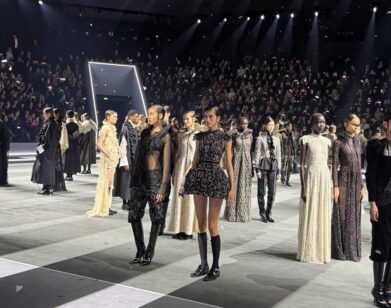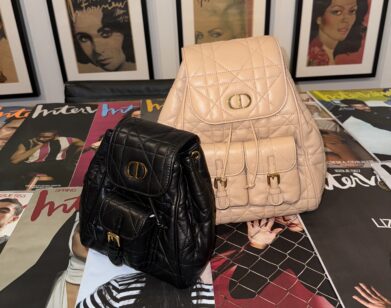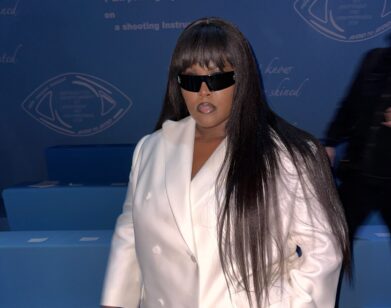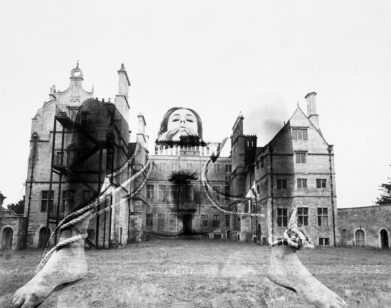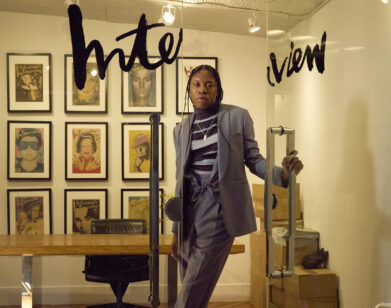DEEP DIVE
John Galliano and His Claw Clip Are Asking For Understanding, Not Forgiveness
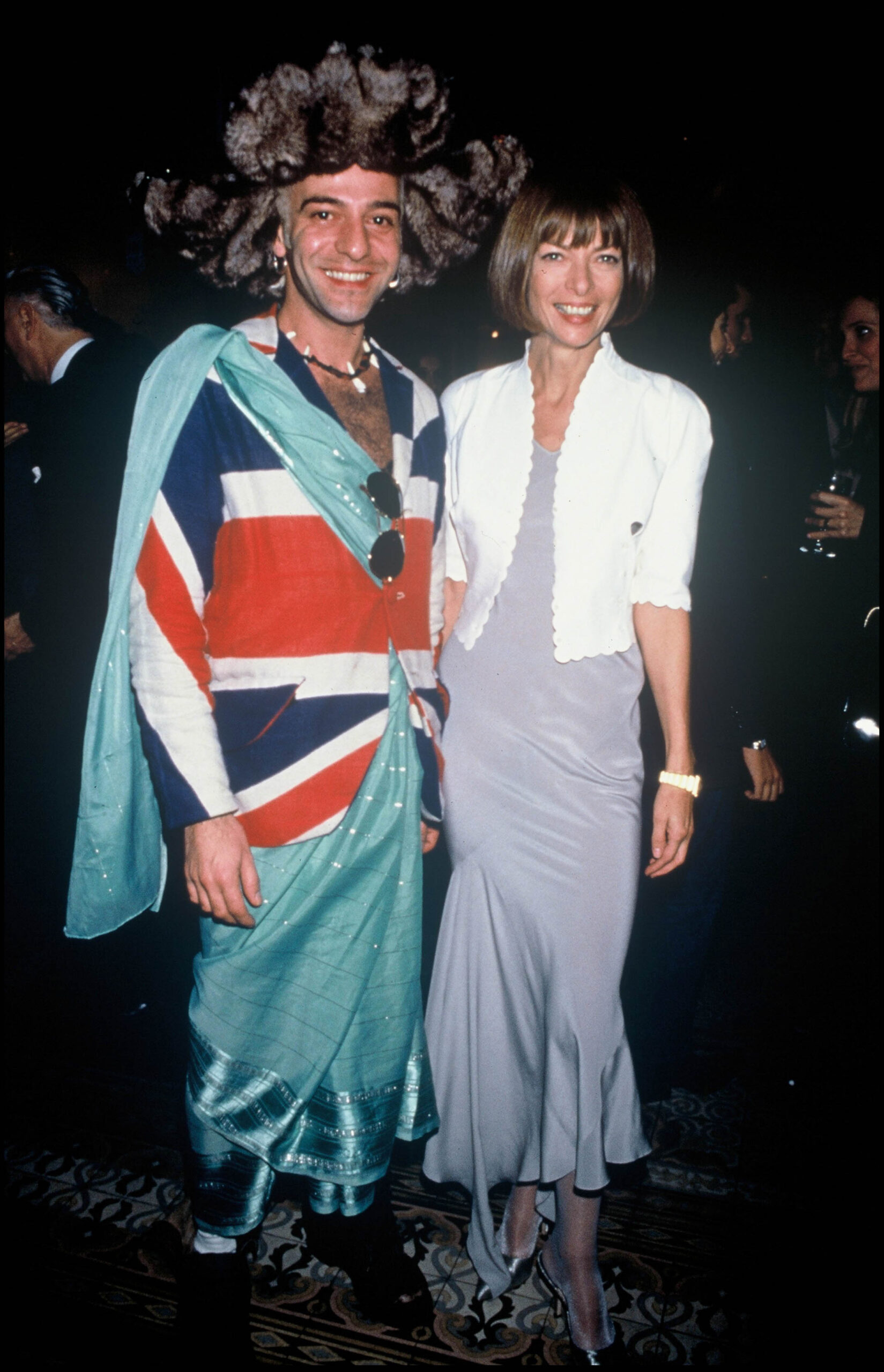
ARCHIVES – LE COUTURIER JOHN GALLIANO ET ANNA WINTOUR EN SOIREE A PARIS EN 1993
At the end of High & Low: John Galliano, a new documentary from the award-winning director Kevin Macdonald, viewers are left asking themselves the same question they came in with: should John Galliano, the once-exiled fashion titan, be forgiven for his sins? There isn’t an easy answer when the sins of said titan, the former Dior designer and current creative director at Margiela, include several anti-Semitic outbursts, nor is Macdonald interested in telling viewers how to feel. Instead, we’re left with a rather complicated portrait of an overly ambitious creative, one that reveals the beauty and horror of high fashion, in all it’s vain glory.
———
TAYLORE SCARABELLI: We’re recording. I’ll start by asking you a very basic question. Why did you choose to make a documentary on John Galliano?
KEVIN MACDONALD: Because he’s a really interesting character. He’s one of the rare artistic geniuses who has been through a terrible career-ending incident in their lives, but has come back to be as productive and as creatively fecund as he was before. I was also fascinated by the ideas of forgiveness, and cancel culture, and whether or not we can ever really know what’s happening inside somebody else’s head. How do we know what’s sincere? What drives someone to do something? Especially if that person was a blackout drinker when they did it. All these questions revolve around art versus the artist, and whether you should forgive bad behavior.
SCARABELLI: So, in doing this project, do you think that he should be forgiven?
MACDONALD: It’s up to you as a person whether you forgive him or not. For me, yes, because I got to know him and I like him, and I don’t believe that he is ideologically anti-Semitic in any way. But I believe what he said was a desperate social suicide at a point when his life was unbearable. Should he have been punished for that? Yes. But what’s the purpose of sending somebody to jail if it’s not to rehabilitate them? I think John has tried to rehabilitate himself, that’s because I believe certain things that he said. But many people come out of the film with a different point of view, they don’t necessarily find him believable. So, that goes back to the complexity of human character.
SCARABELLI: Right. It’s an incredibly complex situation, and it’s a lot to tackle alongside his career. Right now, so many people are making these horribly long documentary series. But in this case, I felt like the film could have been a show. There’s so much more to unpack, particularly when it comes to the fashion industry.
MACDONALD: That’s the first time anyone has ever told me that any film I’ve ever done is too short. [Laughs] One of the things I’ve been interested in is how many people have been frustrated by the open-endedness of the film. I’m like, “What ending do you want me to give you? An ending which tells you, ‘Oh, he should be forgiven. He’s a great guy.’ Or an ending which says, ‘He’s a villain, he said this terrible thing.'” Clearly, both of those would be idiotic. It’s much more interesting to make a film which leaves your audience asking questions of themselves and of him.
SCARABELLI: Well, we live in a time where ambiguity is frowned upon. People can’t handle it.
MACDONALD: Yeah, I think it’s also indicative of the puritanical worldview, which wants to simplify and flatten everything. I think that part of art’s place is to complicate life, not necessarily to offer salves.
SCARABELLI: Speaking of art, the way you shot Galliano was quite compelling, you had him looking directly into the camera, telling his story in such a passionate way. That, juxtaposed with his runway performances, reveals that he truly is an actor. It’s as if he’s performing a role in this film, he’s still doing his walk of shame, and he’s tempered his appearance for it. Him wearing a claw clip in his hair, that’s a costume.
MACDONALD: That’s true. I remember when I turned up to do the first interview, he was on vacation in the south of France in this lovely house near Saint-Tropez, and he said to me, “What should I wear?” I said, “I just want you to be yourself. The more authentic and raw you are, the better.” I saw in his face a puzzlement of, “Oh, I’ve got to be myself. Who is that? What does that person wear?” I could see the calculation going on because I think he’s somebody who doesn’t necessarily have a firm grip on his sense of self. He plays many roles, and this is the role of the authentic John Galliano wearing a hair clip and without makeup, warts and all.
SCARABELLI: In the film, everyone speaks about John creating fashion fantasies as a means of escape from his childhood trauma. There’s a sense that he still lives in that fantasy world now, and perhaps not in a way that’s beneficial to him. I’m thinking about the moment in the film when you remind him that he didn’t have just one, but three separate anti-Semitic outbursts at La Perle, and he goes, “What?” He’s trying to prove that he’s done the work, but you still get the sense that he’s living in a bubble. He spends all this time hiding out in his fancy house in the south of France. He’s still designing collections. It’s almost as if he’s never truly face-to-face with the world. It’s that same sentiment that has made him such an amazing designer, but it might be his downfall now.
MACDONALD: I think that goes to the nub of the question, doesn’t it? Which is fashion is all about denying the ugliness of things. And he is the preeminent example of that. He will create a narrative to escape into a fantasy world in his own life to such a degree that he doesn’t even remember that this happened three times, even though he’s been to court. He doesn’t remember because he’s created a narrative. He’s found a way not to have to think about it in its most negative form. But can anybody lead a good life and be a good citizen if they don’t take at least some basic responsibility for themselves and their actions?
SCARABELLI: Yeah, it’s hard to know what’s going through his head, and perhaps it’s not even relevant to ask whether he is anti-Semitic or not. He still said those things.
MACDONALD: And he was taken to court, and lost, and had to pay a small fine. So, in a way, the question then is if he’s not ideologically anti-Semitic, which I have absolutely no doubt that he isn’t because the guy does not have an ideological or a philosophical or a moral bone in his body, then how should we treat him? And I agree with Robin Givhan, who at the end of the film talks about how we need to be mature enough to hold two conflicting ideas in our heads at once.
SCARABELLI: I find it interesting how you highlight how he blew up in the ’90s during a time of rapid globalization, when what is now considered cultural appropriation was often considered cultural appreciation. In fact, his cultural insensitivities often brought him success.
MACDONALD: I think the key moment for me, which is the preempting of the incident, was the show where he was inspired by the homeless people and Charlie Chaplin. His response to the critique of that show even today is extraordinary. He says, “Why are people so upset? It was just beautiful. I don’t understand.” And I think that sums it up. There’s an insensitivity to minorities or other cultures, but I also don’t think that John is not doing it in a malevolent way. But it is true that he was praised by everyone when he was taking Maasai tribespeople’s necklaces and making dresses out of them. People thought, “Wow, how incredible.”
SCARABELLI: You use clips from the Napoleon film throughout the documentary, and there’s a moment where John says to you, “I don’t know why you keep bringing up Napoleon.” Do you think he understood that reference?
MACDONALD: There’s something about the toreador presentation of Napoleon, which is also part of John. He put on this air, this performance of being a tough guy facing the world. When I showed him the film, the first thing he said was, “Oh my god, I love the Napoleon clips.” I don’t think he understands why he’s obsessed with it. I think, for him, it’s just very beautiful. But then you see the numbers of times he’s dressed as this character, the numbers of times he had him on his T-shirt, or had a photograph of Napoleon behind him. There’s all sorts of reasons why that character would appeal to him. He’s a boy from the south who comes to the north, who speaks with a funny accent and gets bullied at school. John got bullied for being effeminate, for looking different, sounding different. Both rise to the top of Paris, and become kings and emperors, and then they have their downfall and their exile. They both come back, but Napoleon only for 100 days. John’s been back for 10 years, but the parallel is there, and I think John recognizes that.
SCARABELLI: It’s interesting we’re speaking today, when a very renowned designer, Dries Van Noten, just announced that he’s stepping down from his own fashion house. Dries has always been very outspoken about the pressures of the fashion industry. People are really sad he’s leaving, but after watching this film, I’m just like, “Good for him.” I wish John could have had the kind of hindsight that Dries did.
MACDONALD: I think Dries Van Noten has a very different personality and is probably more self-aware and intellectually equipped. John was very young when he took on this big role. He was treated like a rockstar, and he was paid huge amounts of money for the time. There’s an interesting interchange between Sidney Toledano [the former CEO of Dior] and John in the film where Sidney’s like, “Nobody was overworking him. He chose it. You have to have that self-destructiveness inside yourself.” And John’s like, “That’s not true. I was expected to do 32 collections. I couldn’t have done that.”
SCARABELLI: Mhmm.
MACDONALD: They’re both seeing the same thing from their different perspectives. I think that it was unreasonable what was expected of him, but John also willingly took it on. If you said to him, “Do you want to have oversight of the advertising?” He’d go, “Yes, because I want to be able to control the whole image.” So, Sidney’s right in a way. He did embrace the work. But any good boss at any good company—maybe things are just very different now—has a duty to care for their staff.
SCARABELLI: I think creative directors still face immense pressure and are expected to create far too many collections, it’s just that now we have language to explain burnout and things like that.
MACDONALD: Yeah, but I think there’s a part of the camaraderie, and the intensity and burning the midnight oil that made people feel inspired and like they were doing something special and worthwhile. If you take all of that away and say, “Everyone can only work 38-hours a week,” it doesn’t work necessarily for creative people. John is now trying to lead that kind of life. He never goes home later than seven. He goes away every weekend. He’s in his garden. He’s got this very lovely partner, Alexi, who doesn’t appear that much in the film because he’s quite shy, but I don’t think John would be alive without him. In a way, John’s story is a love story. For 25 years, this guy’s been by his side. He could have and probably should have left him at any number of points, but he stuck with him. He cared for him when he was unspeakably horrible. But there is something so lovable about John. And you see that in the film. All these models [Kate Moss, Naomi Campbell] agree to appear in it, even though there might be some danger supporting John. They agree because they’re so loyal to him.
SCARABELLI: Well, the other love story was about his right-hand man Steven Robinson, who tragically passed away in 2007 from what I read was a cocaine-induced heart attack.
MACDONALD: Yes, I think most of those who knew him and the circumstances of what happened would call it attempted suicide. He went home with a huge bag of coke, told his family that he had to work, and told John he had to go back to his family. I think he just couldn’t take the pressure. And of course, when he died, John had to take everything on, and there was no way he could continue. And so, it was only a matter of time. But as Alexi himself said to me, “I couldn’t tell John anything. I would say to him, ‘You’ve got to go to rehab,’ and he’d just yell at me and say, ‘I’m not an alcoholic, what are you talking about?'” I’m sure you know addicts. They can lie and cheat and convince you of anything. It’s the genius of the disease. And so, I don’t blame Alexi or Sidney. I blame the work culture. I think it was completely unsustainable and not positive for anyone.
SCARABELLI: That reminds me, I recently saw a clip of Rick Owens being asked how he stayed sober after all these years. He said something like, “Well, back when I was starting out, I really had to prove myself and I had to do all these things, so I drank a lot. I was a terrible alcoholic. But I needed it to make this happen, and now that I’m successful, I don’t need the booze anymore.”
MACDONALD: It’s a bit like what Kate Moss says in the film, “We were both very shy people until we had a couple of drinks.” John needed to be a leader and to be out there doing his thing. And he needed alcohol to give him that courage and the energy, but he happened to have a predisposition to alcoholism and addiction, and he couldn’t escape it.
SCARABELLI: There are a lot of rumors swirling around that John might be in the running to go to a bigger fashion house, like Givenchy. I don’t know if there’s any truth to that, but do you think he could handle it?
MACDONALD: Yes, I do. As long as he’s got Alexi there to tell him to go home. There was a very interesting moment when I showed John some clips of some of his big shows and he started to shake. He literally couldn’t watch them. And I said, “What’s wrong?” And he said it brought back the feeling, the mania, the darkness, the obsession that he had. And so, I think he wouldn’t want to, and obviously, Alexi would not let him go back into that position. But I think that he’s doing great work. He’s doing a very limited number of shows now.
SCARABELLI: Did Galliano or any of the producers of the film have any say in the final cut of the film?
MACDONALD: I had full editorial control. The film was totally independently financed. John did not interfere at all. But Dior agreed to take part, Sidney Toledano agreed to take part, Anna Wintour agreed to take part. Everyone who had reason perhaps to go, “Hmm, no, we don’t want to publicize that,” participated. But I think it was useful for them to have an outsider make the film, so that they could say, “Look, it’s all out there. We’re not trying to hide anything.” Sometimes, very rarely, being truthful is the best PR policy.
SCARABELLI: Right.
MACDONALD: And I understand why John said yes. As he says in the film, “I don’t expect people to forgive me, but I want them to understand me.”
SCARABELLI: Well, I’m a huge fan of Galliano’s work. It’s a complex story.
MACDONALD: Absolutely. Sidney gets the last word in the film. He says, “It’s a complicated story and he’s a complicated man.” And I think that’s about as good as you can get.

